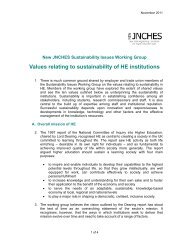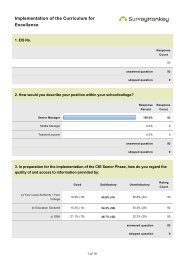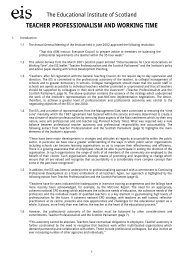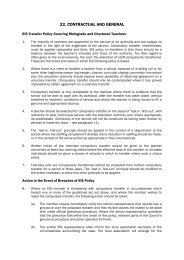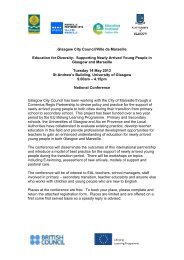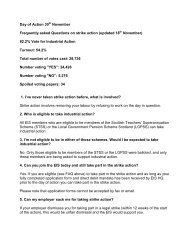Download EIS Reps Handbook
Download EIS Reps Handbook
Download EIS Reps Handbook
You also want an ePaper? Increase the reach of your titles
YUMPU automatically turns print PDFs into web optimized ePapers that Google loves.
17. SCHOOL IMPROVEMENT PLANPOLICY AND ADVICE TO SCHOOLS1. IntroductionThis paper updates <strong>EIS</strong> policy and advice on School Development Planning originallyapproved by <strong>EIS</strong> Executive Council in 2001. It now has a particular focus in relationto the implementation of Curriculum for Excellence, both in relation to the delivery ofthe curriculum itself and appropriate assessment arrangements.2. The School Improvement Plan and Teacher Workload2.1 The School Improvement Plan is one method which offers teachers aprotection against unacceptable increases in workload. It offers some controlover the pace of change within schools as well as the potential for staff withinthe school to ensure that the Plan can be implemented within the frameworkset by the SNCT <strong>Handbook</strong> of Conditions of Service in respect of the workingday, week and year.2.2 The School Improvement Plan needs to be linked to school working timeagreements, which determine, through negotiation, the balance of timeavailable for collegiate work, including development work, in relation to a 35hour working week.2.3 Additional time may be available for the implementation of the SchoolImprovement Plan through Inset days and for some aspects funded CPDarrangements. Teachers may also agree to use some of their own annual 35hours of CPD time to take forward an element of the Plan.2.4 However, the School Improvement Plan cannot in itself resolve all issues ofworkload. Teachers must have regard to the protections afforded in terms oftheir own contracts.2.5 Teachers at all levels of the school must also have regard to issues ofcollegiality and seek to enhance teacher empowerment and professionalismthroughout the education process. Genuine collegial processes in schools havethe potential to raise levels of professionalism, while at the same timemanaging working time and controlling workload burdens.3. Current Practice in Relation to the School Improvement Plan3.1 Since the planning process began in schools, practice in relation to the SchoolImprovement Plan has developed in different ways within different schools: insome schools there are workload committees; some schools have set upschool planning consultative groups; and in many schools, large secondaryschools in particular, the process of improvement planning is in part devolvedwithin the school, e.g. to secondary subject departments. Many schools andauthorities have moved, also, to 3-year cycles for improvement planning.3.2 However, it is apparent that in many schools practice is unsatisfactory. Inparticular, in many schools, teachers are not fully involved in the process.60September 2012








